
SafetyZone
Natural gas is a useful resource, but it must be treated with respect. Safety around natural gas is very important. Read more below.
What’s that smell?
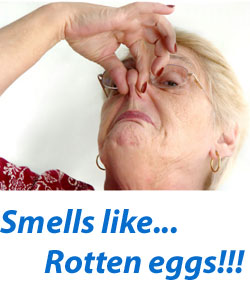 Natural gas is an important and powerful energy source that has hundreds of uses: from powering clothes dryers and heaters to cooking food in ovens, on ranges or barbecue grills, to helping in the production of herbicides, detergents, and antifreeze.
Natural gas is an important and powerful energy source that has hundreds of uses: from powering clothes dryers and heaters to cooking food in ovens, on ranges or barbecue grills, to helping in the production of herbicides, detergents, and antifreeze.
As an aeriform substance, gas is colorless and odorless, so gas companies add a chemical called mercaptan. Mercaptan has a strong sulfur-like or “rotten egg” smell, making its addition to natural gas helpful in the detection of leaks.
In your home, a slight odor of mercaptan might simply mean that somehow a pilot light on a stove has been extinguished. If so, turn off the gas, wait 10 minutes or more while at the same time ventilating the area, then relight the pilot light.
A strong odor of mercaptan is your indication that there may be a more serious problem. Leave the area immediately. Do not turn on OR off any electrical appliances or lights. Do not use a phone or cell phone in the building where the leak is suspected. Leave the area and call for gas company assistance from a neighbor’s or relative’s house.
Grill Safety
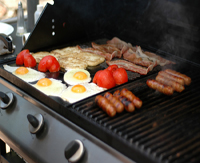 Gas appliances are terrific for cooking under quick, controllable conditions. Some safety essentials should be observed:
Gas appliances are terrific for cooking under quick, controllable conditions. Some safety essentials should be observed:
- The natural gas flame in the appliance should burn “true and blue”; yellow or orange flames indicate that the appliance should be checked.
- Gas flames are fire; treat them with respect and be safe. Don’t cook in loose clothing or spray flammable liquids nearby.
Keep a dry chemical fire extinguisher in your kitchen.
Here’s how to get the best from all your cooking appliances: Gas grills have precise controls for just the right temperatures – a far cry from fighting with charcoal and lighter fluid!
Remember to brush on marinades carefully to avoid clogging burners. Keep your grill looking new by cleaning it periodically and covering it to protect it from the weather.
Stove Safety
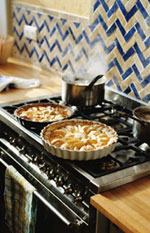 Gas stoves have the same easy-to-control properties as grills. Use the flame size that fits the bottom of your cooking pot; any larger flame wastes gas and could damage the utensil. Teach younger siblings to respect the stove and to stay away to prevent accidents.
Gas stoves have the same easy-to-control properties as grills. Use the flame size that fits the bottom of your cooking pot; any larger flame wastes gas and could damage the utensil. Teach younger siblings to respect the stove and to stay away to prevent accidents.
Gas ovens are perfect for cooking or broiling, but are not meant to be space heaters or clothes dryers. They are designed to cook quantities of food in a small properly-vented compartment, not heat rooms. Using the oven improperly could damage it or make it unsafe as well as possibly creating unsafe levels of carbon monoxide.
An improperly adjusted oven will not burn efficiently and could give off carbon monoxide. Carbon monoxide in a room would cause a person to lose consciousness or worse.
Be safety smart: Use your gas appliances only for the purposes for which they were designed.
Keep That Hot Water Coming!
 Your gas hot water heater provides hot water on demand because of its dependable heating system. Maintain it in safe working order by keeping the area around the water heater free of debris, flammable liquids, old newspapers or other combustible materials. Don’t use its pipes to hang laundry or to store out-of-season clothes. Finally, make sure the temperature setting is correct: 120 degrees if your family doesn’t have a dishwasher or 140 degrees if you do.
Your gas hot water heater provides hot water on demand because of its dependable heating system. Maintain it in safe working order by keeping the area around the water heater free of debris, flammable liquids, old newspapers or other combustible materials. Don’t use its pipes to hang laundry or to store out-of-season clothes. Finally, make sure the temperature setting is correct: 120 degrees if your family doesn’t have a dishwasher or 140 degrees if you do.
Keep your water heater maintained.
Pipeline Safety
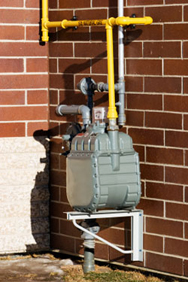 There may be an underground natural gas leak if you see one or more of these warning signs:
There may be an underground natural gas leak if you see one or more of these warning signs:
- You smell natural gas outside. It will smell like rotten eggs.
- You hear a hissing sound coming from the ground.
- You see dirt blowing from a hole in the ground.
- You see a water puddle bubbling.
- You see a ring of dead grass.
If you notice one of more of these signs, there could be a natural gas leak. In case of a natural gas leak, you should:
Leave the area right away and call the gas utility, fire department or other emergency agency to report the leak.
Stay away from the area and keep others away until someone from the gas utility, fire department or other emergency agency says it’s safe to return.
If the gas leak is near a building that uses natural gas, leave the building right away and call the gas company, fire department or other emergency agency to report the leak. Do not use a phone or cell phone in the building where you suspect the leak. Do not light a match or turn any light switches on OR off. Do not turn any appliances on OR off.
Be Safe with Gas Logs
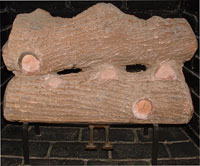 It is very important to be safe around gas logs. Practice this list of safety rules:
It is very important to be safe around gas logs. Practice this list of safety rules:
- Children should never light gas logs.
- Never play with the valves that turn the gas on and off.
- Remind adults to remove the key to the gas valve and store it in a safe place.
- Remind adults to open the flue before striking a match and turning on the gas.
- When gas logs are on, do not sit close to the flames.
- Don’t wear loose clothing such as coats and scarves around gas logs.
- Never place flammable materials such as newspapers or clothing close to the gas logs when they are lit.
- Don’t place damp clothes close to gas logs to dry. Keep them at least five feet away.
Safety Outdoors
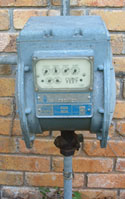 Follow these outdoors safety tips:
Follow these outdoors safety tips:
- Remind your parents to call 811, the national one call number, before you dig. They’ll send someone out to mark the underground utility lines to make sure that there are no natural gas pipes in your work area. The lines must be marked even for small projects like planting a tree, building a fence or installing a mailbox on a post.
- Don’t play, climb on or dig around the natural gas meter.
- Never pile dirt or snow on your natural gas meter.
- Children should never attempt to light outdoor gas grills.
